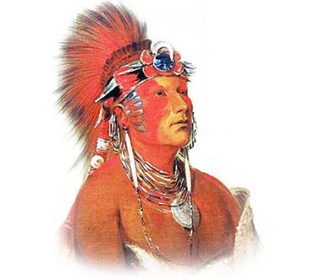Picture of the Kansa Native Indian
The above picture depicts Meach-o-shín-gaw, meaning Little White Bear, who was a distinguished Kansa brave. It was painted by the famous artist George Catlin (1796-1872) at Fort Leavenworth in 1832. The proud young warrior wore striking vermillion red face paint and wore a highly ornate headband with a roach headdress. His finest jewelry was worn including numerous bead and shell necklaces together various ear piercings and earrings. The most decorative earring piece was made using long, cylindrical 'Hair Pipe' beads strung with smaller beads that extended to his chest as a necklace. What was the lifestyle and culture of the Kansa tribe?
The name "Kaw" or "Kansa" means, "People of the South Wind," and the state of Kansas takes its name from this famous tribe. The Kansa people were closely related to the Omaha, Osage, Quapah and Ponca tribes. Where did the Kansa tribe live?
The Kansa (Kaw) are people of the Great Plains Native American cultural group. The geography of the region in which they lived dictated the lifestyle and culture of the Kansa tribe. The American Great Plains region mainly extended across states of Iowa, Kansas, Minnesota, Missouri, Nebraska, North Dakota and South Dakota Land: Grass covered prairies with streams and rivers Climate: The climate was hot summers and cold winters Animals: The animals included the Bison (Buffalo), deer, cougars, elk, bear, beaver, porcupine, antelope, prairie dogs, eagles and wolves Fish: Various fish including sturgeon, crayfish and mussels Crops: The crops grown in the area were corn, beans, seeds and squash
What did the Kansa tribe live in?
The Kansa tribe lived in villages of thatched longhouses, farming in the close area. The hunted for buffalo on the Great Plains during the summer when they lived in the temporary shelters provided by tepees. What language did the Kansa tribe speak?
The Kansa tribe spoke in the Dhegihan dialect of the Siouan language, closely related linguistically to the Sioux and the Stoney tribe. What food did the Kansa tribe eat?
The food that the Kansa tribe ate included crops of maize, beans and squash and fish caught in the rivers. In the summer the hunters provided a variety of meat, especially the buffalo. What weapons did the Kansa use?
The weapons used by the Kansa tribe included bows and arrows, stone ball clubs, hatchet axes, spears, lances and knives. Painted war shields were used on horseback as a means of defence. What clothes did the Kansa tribe wear?
The men of the tribe wore a variety of clothes including a red or blue breechcloth with a belt, and deerskin leggings, and sometimes a blanket robe over the upper part of the body, often trimmed with fur. Buffalo hides were also worn as cloaks and moccasins were worn during the winter. The men of the Kansa tribe wore Roach headdresses that were attached to a scalp-lock on their shaved heads and stood straight up from the head like a tuft or crest. Ornaments were made of beads, shells and metal. The 'Hair Pipe' beads were long, slim, hollow, cylindrical beads that were used as hair decorations, chokers and the famous breastplates that were worn by many of the tribes of the Great Plains. The women wore buckskin knee-length dresses or skirts, leggings and blanket cloaks. What was the religion and beliefs of the Kansa tribe?
The religion and beliefs of the Kansa tribe was based on their belief in the Great Spirit and Animism that encompassed the spiritual or religious idea that the universe and all natural objects animals, plants, trees, rivers, rocks, mountains etc. The Kansa religion involved vision quests and many different spirit beings, or wakan, who held different powers. Kansa History: What happened to the Kansa tribe?
The following Kansa history timeline details facts, dates and famous landmarks of the people. The Kansa timeline explains what happened to the people of their tribe. Kansa History Timeline 1500's: Kansa Native Indians settle in Kansas 1541: Francisco Vasquez de Coronado (1510-1554) explores Kansas 1601:Juan de Onate makes contact with the Kansa tribe 1670's: The French establish fur trading posts in the area 1673: Jacques Marquette inscribed the name of the "Kanza" nation on his map 1780: Conflicts arise with Iowa and Sac tribes 1801: A devastating smallpox epidemic kills many people 1802: They number of Kansa people considerably declines due to sickness and inter-tribal warfare 1803: The Louisiana Purchase 1804: Lewis and Clark expedition (1804 - 1806) attempted to make contact with the Kansa tribe, but the people were on a buffalo hunt 1806: A grand council was held September 28, 1806 between Zebulon Pike and James Wilkinson and various chiefs of the Kansa, Pawnee and Osage Nations 1813: Manuel Lisa (1772 -1820) established Ft. Lisa, the most important trading post on the Missouri River, controlling trade with the Otoe, Omaha, Pawnee, Missouria and other neighbouring Indians from 1813 to 1822 1825: The tribe cede land in Missouri to the United States and move to a reservation in Kansas 1830: The Indian Removal Act 1832: The artist George Catlin visits the Kansa tribe 1836: They joined with other tribes in more treaties with the U.S. Government 1837: Second great Smallpox epidemic kills many Native American Indians 1846: The Kansa were assigned a reservation at Council Grove on the Neosho River, Kansas 1862: The Homestead Act allowed white settlers to move into Kansas and Nebraska 1870's: The buffalos had been deliberately slaughtered by the whites to the point of extinction so ending the lifestyle of the Great Plains Native Indians 1873: Removal to Indian Territory in northern Kay County, Oklahoma 1887-1934: General Allotment Act (1887) began land allotment of Native Indian territory 1902: The Kaw Allotment Act of 1902 legally obliterated the tribe until federal reorganization in 1959 The Kaw Nation SouthWind Casino near Newkirk was established
Kansa History Timeline |
